“Blazing Saddles,” directed by Mel Brooks and released in 1974, is a landmark in American cinema, celebrated for its audacious humor and sharp social commentary. As a parody of the Western genre, the film cleverly navigates through themes of racism, politics, and the absurdity of stereotypes. It features a star-studded cast, including Cleavon Little as Bart, the first Black sheriff of a small town, and Gene Wilder as Jim, the Waco Kid. This film has not only entertained audiences for decades but also sparked discussions around its provocative dialogue and cultural significance.
One of the film’s enduring qualities is its memorable quotes, many of which have become part of pop culture lexicon. Here, we’ll explore some of the most iconic lines from “Blazing Saddles,” highlighting their comedic brilliance and relevance.
1. “What in the wide, wide world of sports is going on here?”
This quote, delivered by Taggart (played by Slim Pickens), encapsulates the absurdity of the situation as the characters face the unexpected chaos surrounding them. The phrase has transcended the film, often used humorously to express confusion in various contexts, making it a favorite among fans.
2. “Badges? We don’t need no stinkin’ badges!”
This line is a parody of the famous quote from “The Treasure of the Sierra Madre,” showcasing how Brooks takes something familiar and twists it for comedic effect. The line speaks to the film’s irreverent tone, mocking authority and traditional Western heroism. Its catchiness has led to its use in numerous other contexts, often to humorously dismiss official credentials.
3. “I’m not a bad guy. I’m a good guy. I’m a bad guy, but I’m a good bad guy.”
This line from Bart captures the complexity of his character and the film’s central theme of moral ambiguity. The humor here lies in the contradiction, reflecting how characters in the film often defy typical archetypes, which was particularly refreshing for the time. It also serves as a humorous commentary on the nature of good and evil in storytelling.
4. “I’ll see your Schwartz and raise you a Schwartz!”
This playful exchange, filled with wordplay, demonstrates the film’s clever writing. The character’s use of “Schwartz” refers to the concept of power and influence, and this line emphasizes the film’s satirical take on machismo and bravado. The comedic effect is amplified by the absurdity of the situation, where such statements are delivered with utmost seriousness.
5. “It’s good to be the king.”
Originally popularized by Mel Brooks in another of his films, this phrase appears in “Blazing Saddles” and has become a catchphrase in its own right. It reflects the film’s critique of power dynamics and the privileges that come with leadership, all while maintaining a lighthearted tone. This line is often quoted in discussions about leadership, authority, and privilege.
6. “You know, it’s funny, but I never figured you for a guy who would go for a black man.”
This quote illustrates the film’s bold approach to race relations, showcasing the absurdity of prejudice. By juxtaposing characters’ expectations with reality, the film forces audiences to confront stereotypes and societal norms, all wrapped in comedic dialogue. It remains a poignant reminder of the challenges of racial integration and acceptance.
7. “The sheriff is near!”
This quote is both a literal statement and a humorous twist on the traditional Western trope of the heroic sheriff. In “Blazing Saddles,” Bart’s character subverts the expected hero narrative, providing both laughter and a commentary on the role of law enforcement in society. This line captures the excitement and tension typical of Westerns while injecting a dose of absurdity.
8. “You can’t do that! This is a man’s job!”
This line humorously highlights the gender dynamics of the time and the expectations placed on men in traditional roles. It plays into the film’s broader theme of challenging stereotypes, making the audience reflect on the absurdity of such notions. Brooks uses this moment to critique the limitations society places on individuals based on gender.

Leave a Reply